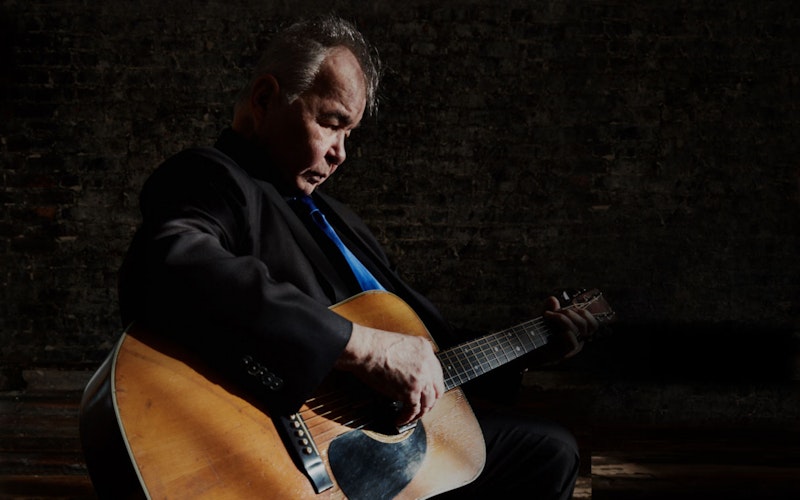
Music
John Prine, Willie Nelson, and Greeting the Grim Reaper
There’s a strange symmetry between the impressive recent releases from two veteran masters. Willie Nelson’s Last Man Standing and John Prine’s The Tree of Forgiveness both dance with the daunting subject of human mortality. Together, they offer a reflection on the strange relationship we all have with death—and how faith might color it.
It’s not only his own 85 years that have Willie Nelson contemplating the end of life; most of his old running buddies have finished their races, while he is still out there on the road, cutting records and logging miles. It will come as no surprise to his fans to hear that Willie confronts the subject, for the most part, with lightness and good humor. The songs on Last Man Standing offer all of the theological depth of a buzzed uncle’s toast at a wedding.
In fact, a good toast might be the best parallel for the lyrical approach on the album. The cleverness is far more important than the content. “Heaven Is Closed” offers a particularly confusing bit of existentialism. “Heaven is closed, and hell’s overcrowded / So I think I’ll just stay where I am,” he sings over a winning Texas waltz.
On the title track, Nelson suggests that being the last man standing is certainly better than being dead, especially if you’re unsure about what’s waiting on the other side. On “I’ll Try To Do Better Next Time” he cites “the Good Book” and its instruction to love everybody, then promises to be reincarnated. On “Bad Breath,” a song that suggests Nelson might be at the point of recording every song idea that crosses his mind, he playfully admits to having some major dragon breath, which he blames on “puffing on this and sucking on that” before proclaiming that “bad breath is better than no breath at all.” And I thought Christian music had cornered the market on bumper-sticker lyrics.
But in the final analysis, Willie gets a pass. The songs here sound perfect. The production is flawless. The tone, across the board, is sincere and pitch-perfect. Sure, his theology is shallow at best. And with the exception of the vulnerable and sincere ballad “Something You Get Through,” the songs are more like the pleasantries people exchange than the heartfelt conversations shared during life’s most difficult moments. In considering his own mortality, Nelson is certainly choosing to whistle past the graveyard. Fortunately for us, the man has a knack for a good melody.
In considering his own mortality, Nelson is certainly choosing to whistle past the graveyard.
John Prine, on the other hand, seems determined to set up camp in the cemetery and have a church service there. Though he’s 14 years younger than Nelson, he sounds older. Recent cancer struggles have taken a physical toll that Prine boldly and bravely refuses to cover up. Heck, he’s been singing about mortality since his debut album in 1971, why should he stop now?
On The Tree of Forgiveness, his first collection of new material in 13 years, every essential Prine ingredient can be found. With impossibly simple lines, irresistible melodies, and a bittersweet sense of humor, The Tree of Forgiveness is lean, but generous.
“Summer’s End,” with imagery that ranks among his finest, offers a sort of prayer for a prodigal: “Come on home. Come on home. / No, you don’t have to be alone. / Just come on home.” Try singing along, thinking of a lost loved one, and not choking up.
The closing trio of songs do something Prine, to my recollection, has never done before. Though he’s often used biblical imagery, I can’t recall a song as sincerely worshipful and prayerful as “Boundless Love”:
Surround me with your boundless love
Confound me with your boundless love
I was drowning in a sea, lost as I could be
When you found me with your boundless love
He follows this with “God Only Knows,” a song that is both warning and promise, and then closes with “When I Get To Heaven,” a playful affirmation that we are meant for more than this earthly life. (Though I hope if he gets the nine-mile-long cigarette he expects to find, there is a breeze blowing away from us as I listen to him sing.)
Prine owes us nothing, and considering the fact that he has faced down cancer surgery twice in recent years, no one would blame him for simply staying on the sidelines. I, for one, am beyond appreciative of his generosity. Props, also, to producer Dave Cobb and guest artists Sturgill Simpson, Brandi Carlile, Amanda Shires, Jason Isbell, and others who lend their tasteful skills to this work. The songs are framed perfectly.
So here we have two very different examples of veteran artists contemplating mortality in song. Willie winks, while Prine offers something more difficult. Don’t get me wrong: I enjoy Nelson immensely and Last Man Standing is no exception. There are plenty of times in life for a simple toast. But for those with ears to hear and a heart that is ready for a slightly deeper conversation, Prine’s Tree offers some incredible shade. When Prine was only 22, he wrote a breathtakingly sad reflection on aging, “Hello In There.” I’m glad that, some 50 years later, he seems able to sing a different song.
Topics: Music